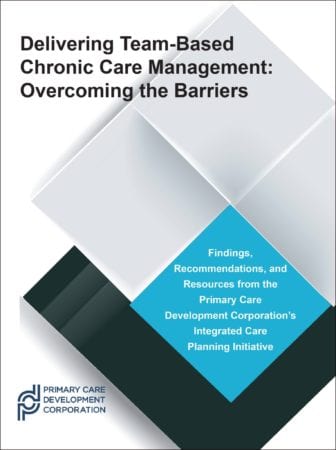New York — The Primary Care Development Corporation (PCDC) has released a new report that provides recommendations to support better health care, particularly for high-risk, high-need individuals. The report, titled “Delivering Team-Based Chronic Care Management: Overcoming the Barriers,” is intended for use by all health care providers and staff involved in chronic care management (CCM), and includes sample tools and workflows created during the project as well as case studies compiled by the Center for Health Care Strategies (CHCS).
 “Most providers recognize the value of care management, but the complexity of health care – in terms of the technology, the social factors that affect people’s health, and the medicine itself – has proved to be a major barrier preventing many providers from doing it properly,” said Ruth Perry, MD, PCDC’s Chief Program Officer. “This report is vital because it not only teaches best practices for creating a sound program, but also examines the situations of real health centers as they work to implement the processes.”
“Most providers recognize the value of care management, but the complexity of health care – in terms of the technology, the social factors that affect people’s health, and the medicine itself – has proved to be a major barrier preventing many providers from doing it properly,” said Ruth Perry, MD, PCDC’s Chief Program Officer. “This report is vital because it not only teaches best practices for creating a sound program, but also examines the situations of real health centers as they work to implement the processes.”
Guided by an expert advisory panel, the project involved four participating health care organizations in the New York metropolitan area and one organization from upstate New York that worked to develop an integrated, team-based system of care management. The organizations were guided by a roadmap created for the project by PCDC. While following the roadmap, the organizations’ change teams documented any challenges they encountered and the solutions they tested and implemented.
“There is near-universal agreement among organizations in the field of complex care that having a strong interdisciplinary team structure is essential to providing high-quality care, but many questions and challenges still remain in how to effectively pull this off,” said Rachel Davis, MPA, Associate Director for Program Innovation at CHCS. “This report provides a valuable resource to help organizations see concrete examples of how this work can be done.”
In recent years, there has been increased adoption of CCM as a strategy to improve clinical outcomes, reduce costs, and provide better care for high-risk, high-need patients. CCM aims to address the medical and psychosocial issues that patients face by delivering comprehensive care from an integrated team of providers representing primary care, behavioral health, and care management. For many providers, this transition to team-based care requires the adoption of new processes and organizational culture change. PCDC has positioned itself at the fore of this trend by offering training and technical assistance services to guide primary care practices through this transition.
Dr. Perry continued: “We are very grateful to the Center for Health Care Strategies for lending their considerable expertise to support this report. Additionally, I want to thank the five participating organizations for contributing to the body of knowledge regarding CCM and providing a foundation from which others will undoubtedly benefit.”
The report is now available in the resources section of PCDC’s website (pcdc.org/pcdc-resources), and was produced with the support of generous grants from the Altman Foundation and The Morton K. and Jane Blaustein Foundation.
About PCDC
Founded in 1993, the Primary Care Development Corporation is a nationally recognized nonprofit organization that catalyzes excellence in primary care through strategic community investment, capacity building, and policy initiatives to achieve health equity. To date, PCDC has helped over 1,000 primary care practices in 34 states to improve delivery of care by providing capital as well as training and technical assistance services. Since its founding, PCDC has leveraged over $800 million on projects that enhance capacity in low-income communities. In 2016, PCDC received a AAA+2 rating from Aeris, an independent community investment rating agency.